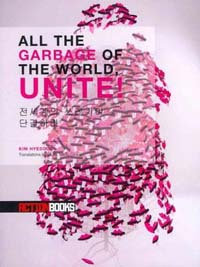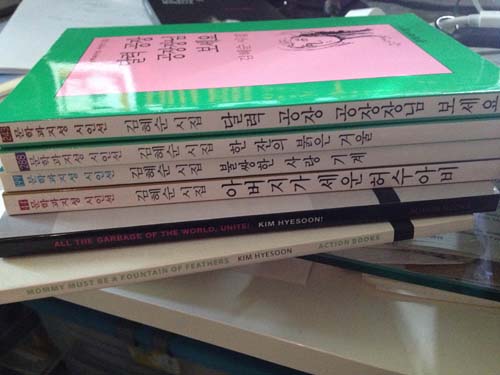25 Points: All the Garbage of the World Unite!
 All the Garbage of the World Unite!
All the Garbage of the World Unite!
by Kim Hyesoon
translated by Don Mee Choi
Action Books, 2010
156 pages / $16 Buy from Actions Books, SPD, or Amazon
1. To be clear, this book, and all of Kim Hyesoon’s books, are tainted by my mother’s death.
2. This of course is not the fault of the author. Simply, I first discovered Kim Hyesoon when Action Books published Mommy Must Be A Mountain of Feathers. I was excited by the images of rats, of devouring, crushed bodies, the somehow endearing repulsion. And I was excited to share these poems with my mother. I bought as many of her books in the original Korean as I could order online, and my mother and I were going to read them in Korean together. We hadn’t read together since I was very young so this was a very special prospect for me.
3. My mother passed away suddenly before we were able to read together.
4. I still have the books, but my Korean isn’t good enough to get through them myself. When I can, I like to look at the poems side-by-side, but mostly, they just sit on my shelf.
5. In an interview, Kim Hyesoon says: “Mothers live somewhere after giving birth to us. Our mothers who have gone are buried in our bodies. It can be said that we were born with dead mothers in our body.” This deeply resonates with me.
6. Still, I couldn’t resist when Action Books put out a second collection of her poems in English.
7. In these poems, everything is both filthy and holy, repulsive and affectionate, present and disconnected.
8. As the text often describes a disconnect between heart and head and body, while reading, the visceral reactions I had seemed to separate my own self into multiple feeling selves, each reaching out over gaps looking for fingertips to grab a hold of, connected by this commonality of loss and distance, yet constantly searching, observing, and unsatiated.
9. In the preface, Kim Hyesoon writes, “I am many inside poetry. ‘I’ as a subject, the cognizant ‘I’ is deconstructed. I have never once lived as a single ‘I’ inside poetry. The confusion of the multiple ‘I’ is what makes me write poetry.”
10. The poem “Lady Phantom,” begins with “There is a corpse in the room / I killed someone,” and then later, “Maybe no one here has left a corpse behind / Everyone’s boisterous as if they have no bodies to hide.” Though there is a penetrance of being singular in this kind of guilt, of course we all have killed. At least I have. I choose to forget, but there are the many bodies stacked up in my closet. Will you find them? READ MORE >
November 14th, 2012 / 9:09 am

